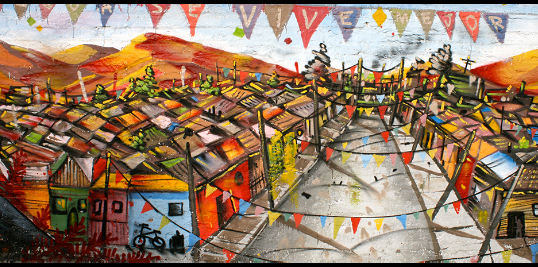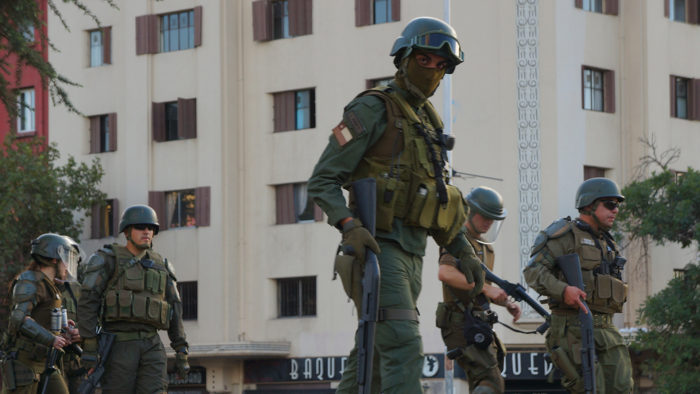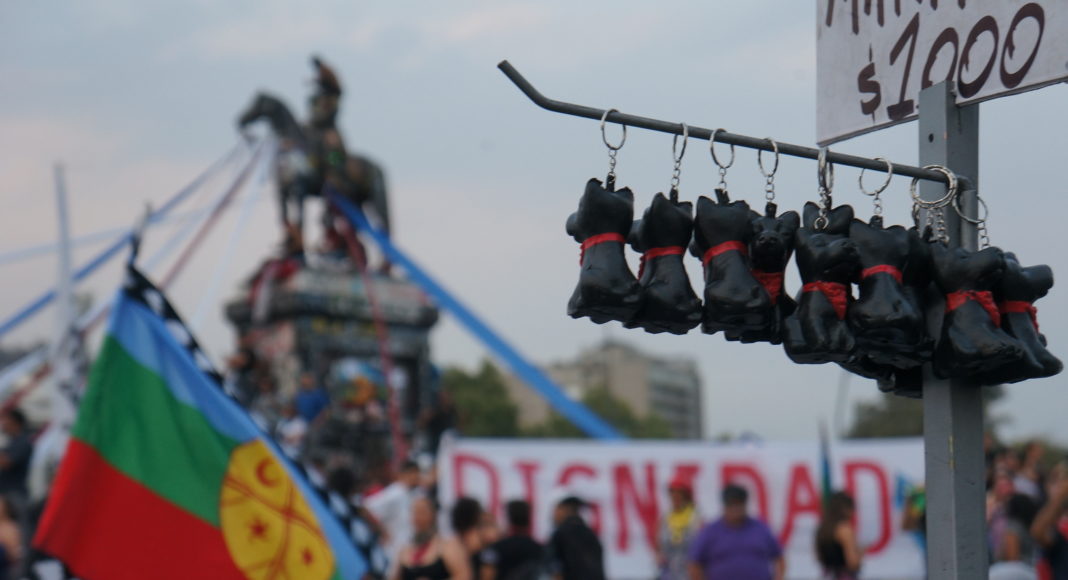- Chile’s constitution is a legacy of the Pinochet dictatorship and has come to symbolise the embedded inequalities that sparked a year of mounting popular protests
- The plebiscite on 25 October must determine whether to start the process of drawing up a new constitution and how the process will be conducted
- Even if the plebiscite endorses both the change and the establishment of a constituent assembly, many in the popular movements fear that they will be excluded and the old, discredited political parties will manipulate the process
Main image: protesters at Santiago’s Plaze de la Dignidad watched over by a line of mascots depicting the famous dog ‘El Negro Matapacos’. Image: Daniel Espinosa Guzmán
This 18 October marks the first anniversary of the ‘Estallido Social’ in Chile which began with student rebellion over metro fare hikes, and culminated in months of protests and socio economic demands. These came from a wide coalition of groups, from trade unions to feminists, which came together to press for a new constitution, that is, to remove the constitution enacted by ruthless dictator Augusto Pinochet in 1980.
The Piñera administration appears to be yielding to demands for change, in the face of increasing discontent at the levels of inequality, and has agreed to hold a plebiscite on 25 October to decide whether the current constitution should be replaced. Yet the months preceding the historic vote have been marred by allegations of brutal human rights abuses and attempts to damp down popular expectations.
Despite a general belief that the Apruebo vote will win, providing the catalyst to finally enable change in one of the world’s most unequal economies and feeble democracies, some sectors remain sceptical that the plebiscite will lead to any real change to Chile’s extreme free market systems.
Two questions
The government has promised that two questions will be posed in the plebiscite, the first ‘that a new constitution should be drawn up’, with the option of Apruebo (I agree) or Rechazo (I disagree). The second question is to determine, if the Apruebo vote wins, the method for drawing up the new constitution, either an Asamblea Constituyente (constituent assembly), or a Comisión Mixta made up of representatives of the present Congress and citizen groups.
Most groups which backed the protest support the Asamblea Constituyente option, floated in October last year as the protests got under way, adamant that a Comisión Mixta would be manipulated by politicians elected under the existing flawed system established under the dictatorship. But some campaigners fear that the process of choosing who takes part in the Asamblea will still exclude many in the popular movements.

‘This is not a plebiscite that has been called for by the people. It is one initiated by Chile’s corrupt political class that has benefited over the last 30 years’ Says Michel Saez activist from La Legua, a working-class area in Santiago that was a symbol of resistance and militancy during the Pinochet Regime. ‘We, the people have taken to the streets to ask for a Constituent Assembly, free, sovereign and plurinominal. The political class have twisted our demands to their advantage and to protect Piñeras interests. We have now been presented with two options: Mixed Commission or Constituent Assembly, neither of which include us, grassroots movements.’
Minorities excluded
Michel fears that the plebiscite will not affect any real social changes, and appears to believe that the option for a Constituent Assembly will be removed. ‘We don’t want another fraud like the 1988 plebiscite [when Pinochet was forced to step down as head of state by the No Vote, but made himself head of the armed forces and Senator for life]. By removing the Constituent Assembly option, social organisations, sexual and ethnic minorities are being excluded from the process. That is why we are conducting our struggle in the streets. We reject agreements made among four walls by an illegitimate political class that does not represent the people. Yet again, we feel robbed by this process.’
The pervasive influence of the dictatorship consists not just in the extreme Neo Liberal economic model that has been deepened by each successive government. It is also evident in the fact that despite over thirty years or work towards a transition to full democracy, many problematic institutions have remained unchanged and unchallenged since the Pinochet regime. One of these is the militarised carabineros police force that yet again hit international headlines on Friday 2 October when a policeman threw a minor from a bridge into a river, leaving the boy unconscious and bleeding.

The security forces came under intense international public scrutiny in October 2019 and well into the new year, as five international human rights bodies unanimously condemned the actions of Chile’s carabineros. Human Rights Watch, Amnesty International, The United Nations among others, all found extensive evidence of deliberate blinding, torture, sexual abuse, arbitrary detentions and even death at the hands of police.
The onslaught of the coronavirus pandemic has not reduced tensions as a strict curfew was imposed preventing many from working and prompting a food crisis that has led to the resurgence of ollas communes, community kitchens. Those running the ollas report being followed by unmarked cars, watched by drones, detained and even beaten during raids on community centres. There have also been cases of violent detention after curfew hours with one case leading to the killing by police of a young construction worker, on his way home.
Protesters undeterred
Campaigners for ‘Apruebo’ however, remain undeterred and are preparing for 25 October when they can voice their discontent and cast their vote at the plebiscite.
As Hector Rios Jara, a sociologist and campaigner reflects, ‘The struggle for a better life and dignity is a long one. A constitutional change will bring fundamental opportunities to guarantee social and political rights and for creating innovative public policy elements explicitly denied under the current constitutional regimen.
‘But transforming Chile will require a more complex political change than simply altering the constitution. I think Apruebo will win a overwhelming majority on a ratio of 70/30. The feelings of impunity and injustice that exploded last October have kept growing during the pandemic thanks to the lack of concern and support from the government. Most people’s pain and dissatisfaction will be expressed in the victory of Apruebo. Although there are doubts about how the process will be led and conducted by political parties, we expect a massive turn-out on referendum day.’
Despite the curfews, national state of emergency and successive laws designed to curb and criminalize social protest, huge crowds continue to gather at the emblematic Plaza Dignidad in Santiago Central every Friday afternoon, calling for constitutional change and an end to police brutality.

